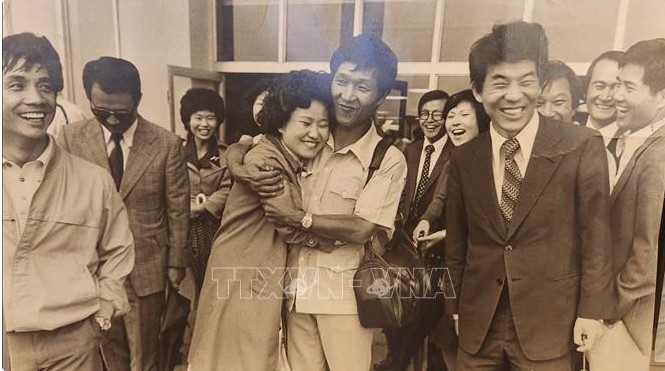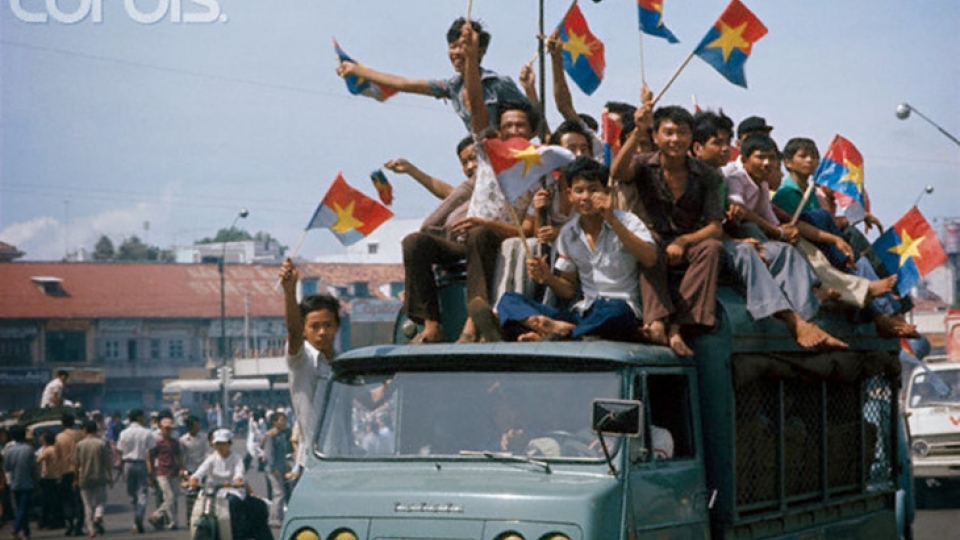Korean reporter remembers days before April 30,1975 victory
As Vietnam approaches the 50th anniversary of the liberation of the South and nation reunification on April 30, Ahn Byung Chan, a former reporter for the Republic of Korea (RoK)’s Hankook Ilbo newspaper, well known for his reports from Southern Vietnam before 1975, recalled memories of those days 50 years ago.

Ahn was the last Korean journalist to leave Sai Gon (now Ho Chi Minh City) on the early morning of April 30, 1975 on the flight that he believed the last one from the US Embassy's building rooftop on April 30.
As a correspondent for one of the RoK’s largest newspapers, he was both the first to arrive in the South and the last to leave. Ahn said he spent about three years in Southern Vietnam, so he can remember all streets in the city's downtown.
He said reporting at that time was challenging. While some major newspapers provided teletypes, he had to go to the central telex office near Ben Thanh Market to send news. Despite orders to leave Sai Gon, his passion for journalism kept him there until the end. As April 30 approached, reports of the South Vietnamese military's defeat grew more frequent, and the city was placed under a strict curfew. Occasionally, there was a few gunshots and the sound of helicopters whirring, Ahn recalled.
During this tense period, he wrote an article entitled, "Empty Room from Sai Gon," expressing his feelings of isolation in his quiet office as the city faced its dramatic end. On April 28, he visited the Korean Embassy and captured images of the flag being lowered, marking the impending liberation.
Ahn described the suffocating atmosphere in Sai Gon amidst the oppressive April heat. The earlier wave of evacuations had diminished, leaving only the US Embassy as the last refuge. Helicopters landed on the embassy's building rooftop, and they added a landing zone on the lawn for prioritising American citizens and allied officials. As a reporter from the RoK, Ahn was among the third or fourth priority groups. On the chaotic morning of April 30, he managed to line up for evacuation. He recalled being among the last to board a helicopter, taking a final glimpse of Sai Gon.
When asked how he felt upon hearing of Sai Gon's liberation just hours later, Ahn expressed gratitude for being present at such a historic moment.
As he sailed to the Philippines after leaving Sai Gon by air, he wished the Vietnamese people joy for their hard-won independence and reunification - a sentiment deeply cherished by him as a Korean.
Ahn expressed his deep love for Sai Gon, stating that even while sitting in the helicopter to leave the city, he was thinking about returning again soon. In 1989, after 14 years, he had a business trip to Vietnam, during which he visited Hanoi. The unforgettable memories of Sai Gon compelled him to return to the city almost every year on April 30. This year, at the age of 88, he still wishes to visit Ho Chi Minh City on this date, marking half a century of a pivotal moment in Vietnam's history.
Each year, whenever he returns to Vietnam, Ahn typically revisits the Continental Hotel, Ben Thanh Market, Nguyen Hue Street, Notre-Dame Cathedral, and the Independence Palace.
Ahn said that he took the reunification train across Vietnam to experience what it means to be a united country. This made him reflect on the current context of the RoK and further admire President Ho Chi Minh. The Vietnamese people achieved something that no other nation in the world has done: ending a war and then re-establishing diplomatic relations with the US, a former adversary.
Ahn noted that Vietnam's spirit of goodwill and practicality has led to its increasing development, prosperity, and strength. The RoK has also been one of the countries with a close relationship with Vietnam for over three decades. He pointed out that the RoK and Vietnam share a history and culture with many similarities, which may explain why the two countries have achieved impressive results over the past 30 years. As a former journalist and a person who loves Vietnam, he always hopes for the continued development of the bilateral relations and for people-to-people exchanges to expand so that Koreans can better understand Vietnam and appreciate the significance and value of unity and peace.



